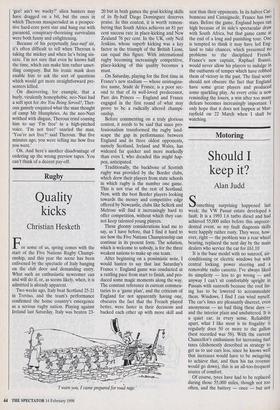Rugby
Quality kicks
Christian Hesketh
For some of us, spring comes with the start of the Five Nations Rugby Champi- onship, and this year the scene has been enlivened by the spectacle of Italy banging on the club door and demanding entry. What such an enthusiastic newcomer can and will do if, or, as seems likely, when, it is admitted is already apparent.
Two weeks ago, Italy beat Scotland 25-21 in Treviso, and the team's performance confirmed the home country's emergence as a serious rugby nation. Playing against Ireland last Saturday, Italy was beaten 23- 20 but in both games the goal-kicking skills of its fly-half Diego Dominguez deserves praise. In this context, it is worth remem- bering that South Africa achieves an 81 per cent success rate in place-kicking and New Zealand 76 per cent. In the UK, only Neil Jenkins, whose superb kicking was a key factor in the triumph of the British Lions, can equal this figure. With international rugby becoming increasingly competitive, place-kicking of this quality becomes a must.
On Saturday, playing for the first time in France's new stadium — whose unimagina- tive name, Stade de France, is a poor sec- ond to that of its well-loved predecessor, Parc des Princes — England and France engaged in the first round of what may prove to be a radically altered champi- onship.
Before commenting on a truly glorious contest, it needs to be said that since pro- fessionalism transformed the rugby land- scape the gap in performance between England and its three oldest opponents, namely Scotland, Ireland and Wales, has widened far quicker and more markedly than even I, who dreaded this might hap- pen, anticipated.
Traditionally, the backbone of Scottish rugby was provided by the Border clubs, which drew their players from state schools in which rugby is the number one game. This is not true of the rest of Scotland. Now, with the best Border players looking towards the money and competitive edge offered by Newcastle, clubs like Selkirk and Melrose will find it increasingly hard to offer competition, without which they can- not keep talented young players.
These gloomy considerations lead me to say, as I have before, that I find it hard to see how the Five Nations Championship can continue in its present form. The solution, which is welcome to nobody, is for the three weakest nations to make up one team.
After beginning on a pessimistic note, I would hasten to say that last Saturday's France v. England game was conducted at a rattling pace from start to finish, and pro- duced some magic moments along the way. The constant reference in current commen- taries to a 'game plan', and the criticism of England for not apparently having one, obscures the fact that the French played better, were faster in their decisions and backed each other up with more skill and zest than their opponents. In its halves Car- bonneau and Castaignede, France has two stars. Before the game, England hopes ran high because of its side's spectacular draw with South Africa, but that game came at the end of a long and punishing tour. One is tempted to think it may have led Eng- land to take chances, which presented no problems to the disciplined French. France's new captain, Raphael Ibanez, would never allow his players to indulge in the outbursts of temper which have robbed them of victory in the past. The final score should not obscure the fact that England have some great players and produced some sparkling play. As every critic is now reminding the losers, a win after too many defeats becomes increasingly important. I only hope that it does not happen at Mur- rayfield on 22 March when I shall be watching.

























































 Previous page
Previous page